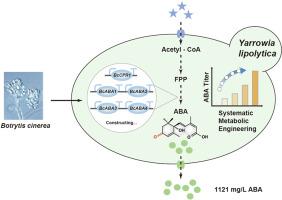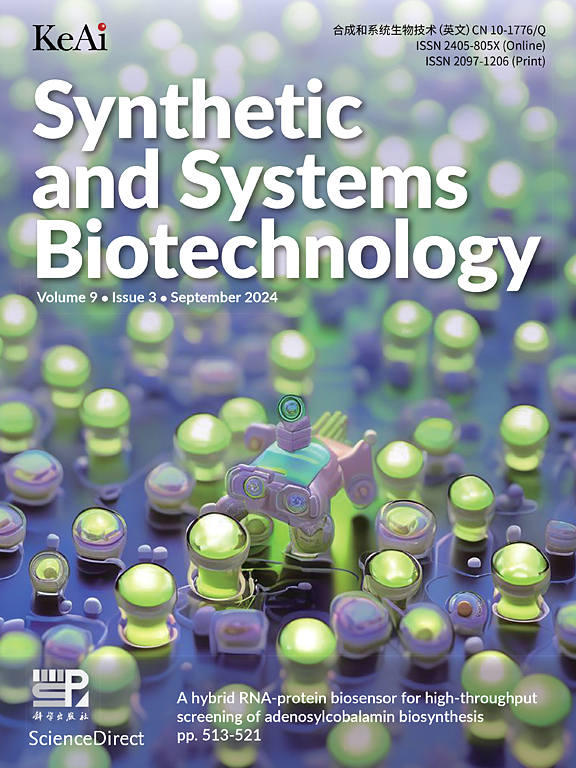利用脂肪分解酵母的系统代谢工程高效生产植物激素脱落酸
IF 4.4
2区 生物学
Q1 BIOTECHNOLOGY & APPLIED MICROBIOLOGY
引用次数: 0
摘要
脱落酸(ABA)是一种重要的植物激素,具有多种用途。目前,它依赖于西尼瑞氏菌的发酵,而西尼瑞氏菌的发酵受制于有限的基因工程工具。在这里,我们改造了脂肪分解蓍草菌(Yarrowia lipolytica),使其能够从头开始生物合成 ABA。为了克服 P450 酶的速率限制,我们实施了系统工程策略。首先,增加溶解氧以提高 P450 酶的活性。其次,扩大内质网以提高 P450 酶的功能表达。最后,组装限速酶以促进底物的运输。此外,还通过加强甲羟戊酸途径进一步提高了 ABA 的产量。最后,工程菌株在 5 升生物反应器中产生了 1221.45 毫克/升的 ABA。这项研究提供了有效的方法来减轻限速 P450 酶的作用,从而提高脂溶性酵母菌的 ABA 产量,并实现具有竞争力的工业级 ABA 生产。本文章由计算机程序翻译,如有差异,请以英文原文为准。

Systematic metabolic engineering of Yarrowia lipolytica for efficient production of phytohormone abscisic acid
Abscisic acid (ABA) is an important phytohormone with diverse applications. It currently relies on the fermentation of Botrytis cinerea, which suffers from limited availability of genetic engineering tools. Here, Yarrowia lipolytica was engineered to enable de novo biosynthesis of ABA. To overcome the rate-limiting P450 enzymes, systematic engineering strategies were implemented. Firstly, the dissolved oxygen was increased to boost the activity of P450 enzymes. Secondly, the expansion of endoplasmic reticulum was implemented to improve the functional expression of P450 enzymes. Lastly, rate-limiting enzymes were assembled to facilitate substrate trafficking. Moreover, ABA production was further improved by strengthening the mevalonate pathway. Finally, the engineered strain produced 1221.45 mg/L of ABA in a 5-L bioreactor. The study provides effective approaches for alleviating rate-limiting P450 enzymes to enhance ABA production and achieve competitive industrial-level ABA production in Y. lipolytica.
求助全文
通过发布文献求助,成功后即可免费获取论文全文。
去求助
来源期刊

Synthetic and Systems Biotechnology
BIOTECHNOLOGY & APPLIED MICROBIOLOGY-
CiteScore
6.90
自引率
12.50%
发文量
90
审稿时长
67 days
期刊介绍:
Synthetic and Systems Biotechnology aims to promote the communication of original research in synthetic and systems biology, with strong emphasis on applications towards biotechnology. This journal is a quarterly peer-reviewed journal led by Editor-in-Chief Lixin Zhang. The journal publishes high-quality research; focusing on integrative approaches to enable the understanding and design of biological systems, and research to develop the application of systems and synthetic biology to natural systems. This journal will publish Articles, Short notes, Methods, Mini Reviews, Commentary and Conference reviews.
 求助内容:
求助内容: 应助结果提醒方式:
应助结果提醒方式:


